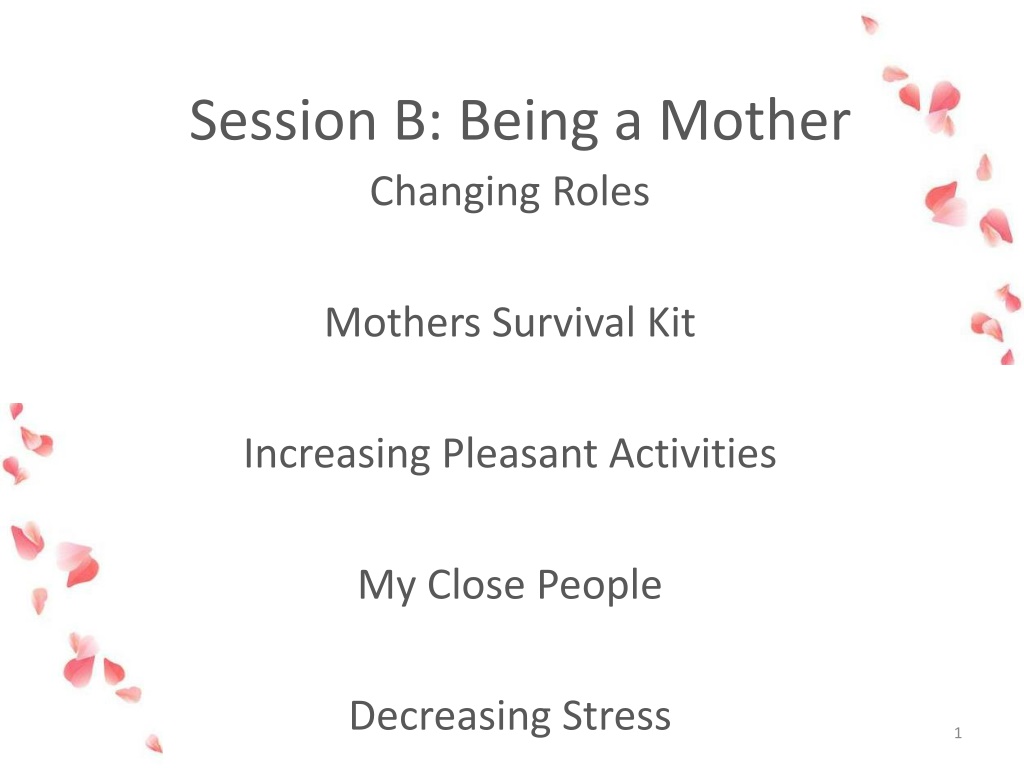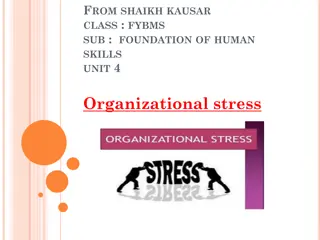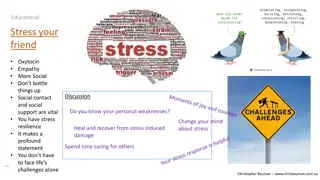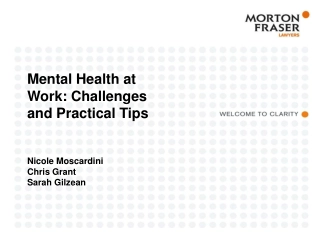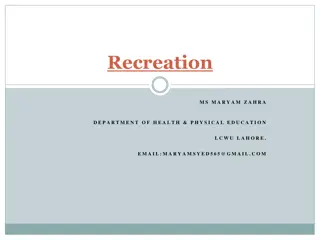Empowering Mothers: Managing Stress and Nurturing Self
Explore strategies for stress management, role transitions, and self-nurturing in motherhood. Sessions cover progressive relaxation exercises, handling role changes, and prioritizing pleasant activities to combat stress. Learn how to embrace the challenges and joys of becoming a mother while maintaining balance and self-care.
Download Presentation

Please find below an Image/Link to download the presentation.
The content on the website is provided AS IS for your information and personal use only. It may not be sold, licensed, or shared on other websites without obtaining consent from the author. Download presentation by click this link. If you encounter any issues during the download, it is possible that the publisher has removed the file from their server.
E N D
Presentation Transcript
Session B: Being a Mother Changing Roles Mothers Survival Kit Increasing Pleasant Activities My Close People Decreasing Stress 1
Session B Stress management Demonstrate progressive relaxation exercise Motherhood as a major role transition Developing Supports 2
Session B Welcome and Check-in Progressive Relaxation Exercise Provide rationale Group demonstration (rate anxiety level before and after) Direct women to the online exercise in workbook Assign relaxation exercise for homework (emphasize importance of practice) 3
Session B Role Transitions Goals for role transition are: Resolve the loss of the old role Develop a balanced view with realistic expectations Develop skills (and permission) for nurturing new mom Develop new social support (e.g., friends with children) 4
Session B Role Transitions Any change is stressful even joyful events Positive and negatives changes of becoming a mother Ask for examples when women have had a change in roles and how they survived. Talk about changes a baby will bring Explore possible losses Explore possible benefits/opportunities Explore associated feelings Normalize the feelings (to offset guilt) Handout on Gains and Losses 5
Changing Roles Gains Losses Slow your pace Loss of routine Spend time with your baby More house hold chores Discover hidden talents less time for partner Loss of productivity Learn new things Loss of social life Nice excuse out of chores Loss of space Isolation Reactions that the baby has Growth of the baby 6
Session B Nurturing The New Mother Importance of taking care of yourself to survive motherhood and prevent postpartum depression Share handout on Mother the new Mother Use analogy of pitcher Importance of pleasant activities Buffer against depression (lifts mood), energizes, etc. The more enjoyable things you do, the better you are likely to feel Ask group for examples of pleasant activities once baby is here Refer to handout on pleasant activities 7
New Mothers Survival Kit Nurture yourself physically (e.g., adequate rest, proper food, exercise) Take breaks mini vacations (rest is rest-no chores during breaks!) Give yourself credit, don t forget to include the small tasks Plan at least one event a day involving an adult (e.g., phone call to a friend) Plan for something fun (e.g., a TV show, bubble bath, look at old pictures) Ask for help-you cannot do it all Postpone major changes in your life 8
Mother the New Mother be Your Own Best Friend 9
Treat yourself You deserve it This is an important time to take care of yourself 10
Session B Developing Supports Importance of positive support Research has shown that support can protect against depression, including postpartum depression People who can confide in others and receive support are less likely to become depressed If you are hesitant to ask for help you may become overwhelmed 11
Session B Developing Supports Ask group to identify supportive people in their lives once baby is here Who will they can turn to, what type of support will they need. Remind women they have a right to reach out, to seek help and support. It is important to look for support from those who are receptive and caring, whoever they may be. Remind women to also include agencies, organizations, providers, place of worship as their supports Continuously probe for possible sources of support. Many women have people who have been supportive of them, but do not label them as support, or are scared or unsure how to ask for the support Ask women to complete the Close People Handout 12
My Close People Next to the numbers below, list the adults that are closest to you. Think about the following: Who are the people in each area that you see the most often? To whom can you seek for help? FAMILY SPIRITUAL FRIENDS 1._________________________ 1._________________________ 1._________________________ 2._________________________ 2._________________________ 2._________________________ OTHER WORK 1._________________________ 1._________________________ 2._________________________ 2._________________________ 13
Session B Homework Remind group of progressive relaxation exercises and to rate anxiety before and after Refer to handout on daily pleasant activities Commit to at least three pleasant activities in this week If time, ask women to provide their activity, date, and time Wrap up Time of session next week, highlights from next session (i.e., relationship communication, improving communication, how to ask for help, and abusive relationship) 14
Potential Difficulties Session B Woman has no time for pleasant activities Empathize, normalize, reassure, use examples from other participants (e.g., other woman have felt selfish ), brainstorm solution, select an activity that requires less time, ask: If you actually did this, how do you think you might feel?, reiterate the rationale for the exercise, emphasize that she deserves self-care 15
Potential Difficulties Woman resists finding solutions Be more directive and active, share solutions from other participants, ask close-ended questions (e.g., have you ever considered..? I wonder if this might be helpful?) No clear solution Examine the woman s expectations 16
Potential Difficulties Interpersonal Isolation Woman says she has no-one to call and cannot generate any solutions Empathize, examine the woman s expectations, ask what she might have done in the past, ask close-ended questions (e.g., have you ever considered going to the or joining a) 17
